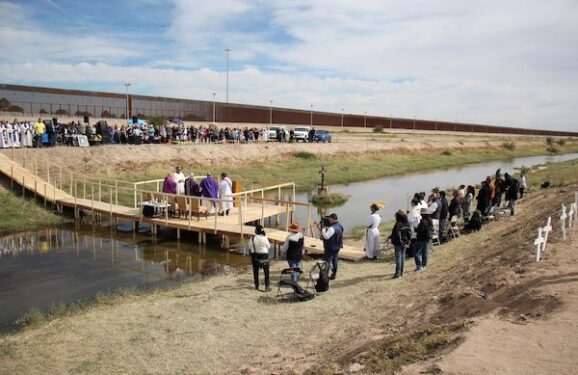
BALTIMORE — When Bishop Mark Seitz of El Paso celebrated Mass from an altar erected over the Rio Grande River earlier this month, attended by parishioners on both sides of the river that marks the U.S.-Mexico border, he cried.
“It brought me to tears, really, and it’s one of those things where you don’t have to have a long explanation,” Bishop Seitz told The Tablet. “You gather and put the altar right smack dab on top of that line that we have drawn in the sand through the middle of the river … and you’re worshiping as one people of faith.”
About a week before the Mass, Bishop Seitz met with recently expelled Venezuelan migrants living in a tent city along the banks of the Rio Grande, distributing rosaries and hearing their stories. The visit, and the border Mass, are two of the many experiences Bishop Seitz has living and ministering in a U.S.-Mexico border diocese that gives him unique insight into the plight of migrants.
And now, Bishop Seitz will be the first bishop with the unique perspective leading a Texas border diocese to head the United States Conference of Catholic Bishops Committee on Migration. He begins a three-year term in the role today with the conclusion of the conference’s fall general assembly.
The USCCB committee was founded in 1949 as the USCCB Immigration Bureau. It got its current title in 1965.
Auxiliary Bishop Mario Dorsonville of Washington, who just finished his term as the USCCB migration chair, told The Tablet that having a border bishop lead the committee given the ongoing migration crisis is significant because “he knows the needs of the people because he’s a shepherd from there.”
The sentiment was shared by other border bishops. Archbishop Gustavo García-Siller of San Antonio explained that with the immigration realities and policies frequently shifting a border bishop provides “more of a living experience” when speaking on the topic.
Bishop James Tamayo of Laredo added that it’s both very important and very helpful to have a border bishop leading the USCCB migration committee because they know the reality of the situation.
“It’s very important and very helpful because Bishop Seitz knows the reality, as do I and all of us along the border,” Tamayo told The Tablet. “We have a beautiful dialogue as Texas bishops, but also with our counterparts in Mexico, and that helps us to know the reality; it helps us know what is coming from other countries and the circumstances that they’ve endured so we’re ready to receive them.”
Bishop Seitz has been the shepherd for the Diocese of El Paso since 2013.
Speaking with The Tablet earlier this week at the USCCB fall general assembly in Baltimore, Bishop Seitz highlighted comprehensive immigration reform, the root causes of migration, and the need for people across the United States to encounter migrants in their communities as intended focuses of the committee, though what the exact initiatives will look like is to be determined.
He said the crisis at the southern border — where border agents encountered over 2,000,000 undocumented immigrants in Fiscal Year 2022 — is the result of country’s failure to address those areas.
“Too often we have characterized the immigration issue as a border issue when it’s really not a border issue,” Bishop Seitz explained. “Do we see some of the symptoms of a failed policy at the border? Absolutely, but it’s really not much more than that because we wouldn’t be seeing what we do at the border if we didn’t have policies that made it almost impossible for people who have fled to flee.”
“And if we didn’t have so many situations in which our country has ignored the needs of countries to our south, and have taken actions that have caused so many destabilizing problems in countries to our south, if weren’t for all of those kinds of choices that we’ve made then we wouldn’t be seeing the situation we do at the border,” he continued.
The third point that Bishop Seitz spoke about were the root causes that have prevented comprehensive immigration reform in the U.S. It boils down, he said, to people across the U.S. encountering the migrants in their communities and hearing their stories, which are opportunities the church can foster.
“What I think priests and bishops need to do is provide opportunities for people to encounter one another, and if that’s happening, I don’t think that leaders in the church have to say hardly anything because once they know the story, and they know what’s happening … then already people have the answers to a lot of questions to these difficult questions,” Bishop Seitz said.
On a national level, through two years in the White House President Joe Biden has reneged on his promise to improve the country’s immigration system. Even if Biden wanted to, the task got even more challenging with the Republicans taking control of the House in the midterm elections.
Regardless, Bishop Seitz said he’ll never lose hope that reform can happen, and emphasized the importance of fostering positive change at the grassroots level.
“All I have to do is help people learn a different narrative than what they’re seeing very often in the media and from the mouths of politicians who use this issue in order to create greater fear and bring people around to their particular perspective,” Bishop Seitz said. “If we present them with the truth then they will discover in the lives of brothers and sisters who are arriving at our southern border.”
